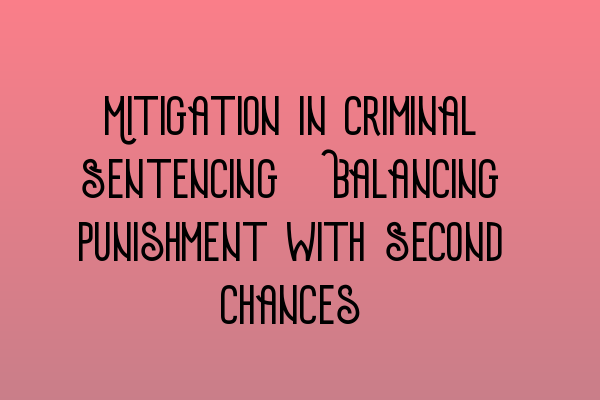Mitigation in Criminal Sentencing: Balancing Punishment with Second Chances
When it comes to criminal sentencing, there are several factors that come into play. One of the most important considerations is mitigation. Mitigation refers to the process of reducing the severity of a sentence by taking into account certain circumstances surrounding the crime and the offender. It is an essential aspect of the criminal justice system that aims to strike a balance between punishment and the opportunity for rehabilitation and second chances.
Mitigation plays a crucial role in sentencing as it allows the court to consider various factors that may have influenced the offender’s behavior or contributed to the commission of the crime. These factors can range from personal circumstances and background to mental health issues or substance abuse problems. By taking these factors into account, the court can tailor the sentence to address the underlying causes of the offending behavior.
One factor that often comes up in mitigation is remorse. Expressing genuine remorse for one’s actions can have a significant impact on the sentencing decision. It shows that the offender takes responsibility for their behavior and is willing to make amends. This can lead to a more lenient sentence, such as a reduced term of imprisonment or the imposition of community-based sanctions.
Another factor that can be considered in mitigation is the offender’s previous good character. If the offender has had a clean record and has never been involved in criminal activities before, this can be seen as an indication that the offense was out of character. In such cases, the court may be more inclined to impose a less severe sentence in recognition of the individual’s otherwise law-abiding life.
The presence of any mental health issues or learning disabilities can also be taken into account during mitigation. These conditions can impair an individual’s judgment, impulse control, or understanding of the consequences of their actions. By recognizing these factors, the court can consider alternative options that address the underlying issues, such as mandatory therapy or treatment programs, rather than solely focusing on punishment.
Substance abuse problems can also be important in mitigation. Addiction can drive individuals to commit offenses that they would not have otherwise. By addressing the addiction through rehabilitation programs, the court can help break the cycle of criminal behavior and provide the opportunity for the offender to turn their life around.
It is worth noting that the extent to which mitigation can influence the sentencing decision may vary depending on the jurisdiction and the specific circumstances of the case. However, it is generally recognized that the consideration of mitigating factors is an important aspect of a fair and just sentencing process.
At SQE Criminal Law & Practice Law UK, we understand the significance of mitigation in criminal sentencing. Our team of experienced solicitors is well-versed in advocating for our clients and presenting strong mitigation arguments to secure the best possible outcome. If you are currently facing criminal charges or require legal assistance, do not hesitate to contact us for a consultation.
Related Articles:
- Essentials of Consideration: Understanding the Backbone of Contracts
- Mistake in Contract Law: Unraveling the Impact on Agreement Validity
- Counter-offers: The Art of Negotiating in Contract Law
- The Formation of a Contract: Understanding the Building Blocks of Agreement
- SQE Workshops on Contract Law: Strengthening Your Knowledge and Skills
